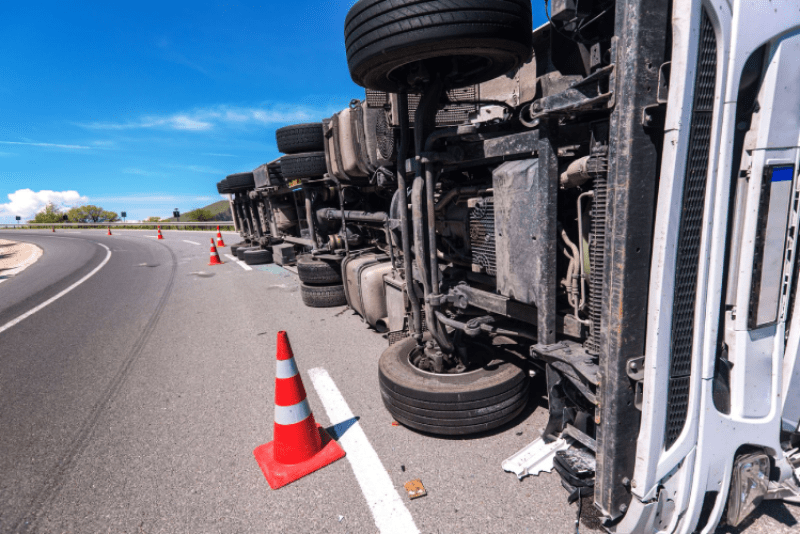California Truck Accident Attorney
- 550+ Google 5-Star Reviews
- $1 Billion won over 15 years
- Won’t settle for low offers, not afraid to fight for max value

Get a Free Case Evaluation
No fees until we win!
All San Diego Case Types

Personal Injury

Brain Injury

Car Accident

Slip & Fall

Truck Accident

Wrongful Death
California Truck Accident Attorney
A 13-year-old boy died in a collision between the SUV where he was a front-seat passenger and a semi-truck in North County. The accident happened when both the SUV and the semi attempted to enter the intersection at the same time. The boy’s mother and a six-year-old girl who was also a passenger in the SUV were seriously injured in the crash. The accident sparked a small brush fire and prompted the closure of the intersection for investigation and clean up.
The economy of the United States is largely dependent on these commercial vehicles. According to a report from Popular Mechanics, 68 percent of all the goods sold in this country are delivered by semi-trucks—around 60,000 pounds of products per each American each year. There are currently about 2.8 million commercial trucks registered across the nation, according to 2016 data.
However, for all the good that these vehicles—also known as tractor-trailers, 18-wheelers, or big rigs—bring, the downside is the danger they pose to the occupants of passenger vehicles who are sharing the road with them. If you’ve been injured or have lost a loved one in an accident with a tractor-trailer, you may be eligible for compensation. An experienced California truck accident lawyer can advise you about your legal options.
Why Are Semi-Trucks So Dangerous?
According to the Federal Motor Carrier Safety Administration 4,889 fatal accidents involved large trucks and buses in the United States in a single year. The number of fatal truck accidents has increased by 42 percent since 2009. In California, the number of fatal crashes involving large trucks has increased every year. In 2017, there were 361 fatal semi-truck crashes.
The survivors of these accidents are often left with catastrophic injuries. Why, though? There are several features of the semi-truck that make it dangerous to the drivers of other vehicles, including:
- Their size: Tractor-trailers, when fully loaded, can weigh up to 80,000 pounds—20 to 30 times more than the average passenger car. They are many times longer than a passenger car and taller, as well.
- Blind spots: Because of their length, semi-trucks have extraordinarily large blind spots, which are places in which the driver of the truck cannot see from his or her side mirror if another vehicle is approaching. This is why directly in front, directly behind, and along both sides but particularly the right-hand side of the truck is considered a “no zone” and drivers are encouraged to stay out of those areas. A good way to gauge whether you’re in a truck’s no zone is to look for the reflection of the driver in his or her side mirrors. If you can’t see his or her reflection, then the driver likely can’t see you either.
- Braking capability: Because of the weight of the vehicle, it takes a tractor-trailer more distance to stop than smaller vehicles. This poses a particular risk to motorists who cut into the lane of travel in front of the truck or come to a sudden stop when a truck is following too closely behind them.
- Acceleration: The weight of the truck also impacts its ability to accelerate quickly. Accidents can be caused when the truck is attempting to merge onto a roadway or into a lane of traffic and either underestimates the speed of other vehicles in the lane or other motorists refuse to slow down or speed up for the truck to merge safely.
- Hazardous cargo: The cargo carried within the trailer of the truck can be hazardous in a few different ways. If improperly loaded and secured, cargo can shift, causing the vehicle to become unbalanced and make it harder for the driver to control the vehicle. Additionally, if the truck is involved in an accident, the cargo can spill out, creating obstacles for other travelers. Finally, many of these trucks handle hazardous materials, including fuel and other chemicals. These materials increase the chance of a fire if an accident does occur, as well as toxic spills on the roadway and the accident scene.
- High center of gravity: As previously stated, tractor-trailers are much taller than other vehicles and have a larger ground clearance. Their high center of gravity makes them prone to tipping over and the ground clearance creates enough space for a small vehicle to slide beneath the truck during an accident.

What Causes Truck Accidents?
There are a lot of different reasons why a truck accident can occur. While not all of these reasons are the fault of the driver, many are. Some of the driver-caused reasons include:
- Driver fatigue: The Federal Motor Carrier Safety Administration notes that a study of large truck accidents and their causes revealed that 13 percent of commercial motor vehicle drivers involved in accidents were considered to be fatigued at the time of their crash. Truck drivers work long hours, often traveling hundreds of miles a day. Additionally, the FMCSA reported that almost one-third of commercial truck drivers have sleep apnea, which is a breathing-related disorder in which the sufferer briefly stops breathing while asleep. Because apnea affects the individual’s sleep, it also affects their alertness during waking hours. While the FMCSA—which regulates the U.S. trucking industry—prohibits drivers from working if they have a medical condition that impacts their ability to drive a truck safely, it is believed that many drivers who have this condition are undiagnosed.
- Drug or alcohol impairment: While truck drivers are required to undergo alcohol and drug testing to detect cocaine, marijuana, opiates, amphetamines or methamphetamines, or PCP in their systems, there are many other drugs—including prescription and over-the-counter medications—that may cause impairment. The type of impairment depends on the drugs that were consumed, but any impairment may slow the truck driver’s reaction time, make him or her inattentive to the task of driving, cause difficulties with controlling the vehicle, and impact decision making.
- Speeding: Truck drivers face tight deadlines and may be tempted to speed to make up time lost for breaks or by driving in congested areas. However, a speeding semi-truck may spell doom for others. The faster a vehicle moves, the more distance it takes to stop and the less time a driver has to react to hazards. As big rigs are already known to require more distance to stop safely, speeding only increases the risk that the driver cannot avoid an accident. In addition, truck tires are not rated for excessive speeds. Driving too fast can increase wear on tires and blown tires pose a risk to other travelers in the form of debris on the road and a truck that is difficult to control.
- Poor training: The United States is facing a truck driver shortage of epic proportions. Because of this, many trucking companies may be tempted to reduce the amount of training spent on new drivers. Though all drivers must acquire a certain level of knowledge and skill to obtain a commercial driver’s license, the course they take likely doesn’t train them as to how to deal with real-world situations that may cause an accident.
- Poor truck maintenance: Because of the miles that commercial trucks travel, along with the strain of additional cargo on the vehicle’s systems, regular maintenance is required. Unfortunately, many drivers or companies do not perform this maintenance as often as they should, creating a risk of a malfunction that may cause an accident. Truck parts that must be maintained regularly include the tires, braking system, steering system, and electrical system.
- Improperly loaded cargo: As previously mentioned, improperly loaded and secured cargo may cause an imbalance that makes it harder to control the truck.
- Distractions: With so many hours alone in the truck, often with long stretches of desolate roadways, many drivers distract themselves with activities such as texting, browsing the internet, posting on social media, messing with their GPS or other systems, talking on the phone, eating or drinking. Distracted driving is a major source of accidents with all vehicle types. According to a 2009 study, 71 percent of crashes involving commercial trucks occurred when the driver was doing something else in addition to driving the truck. The FMCSA prohibits truck drivers from texting while they are driving, and the administration notes that texting while driving increases one’s chances of being involved in a safety-critical event by 23 times.
- Unfamiliar roadway: According to the FMCSA, 22 percent of large truck crashes occur where the driver is unfamiliar with the roadway he or she is traveling. Truck drivers who are in an unfamiliar area may try to suddenly correct a missed turn or exit, causing them to perform an illegal or unsafe maneuver that places the driver as well as other motorists at risk.
- Following too closely: Around 5 percent of large truck crashes occur when the truck driver is following another vehicle too closely. Large trucks should be no less than four seconds behind the vehicle they’re following, and even farther away in inclement weather. Driving closer than that hampers the driver’s visibility and ability to scan the roadway and places them at risk of causing a rear-end accident if the lead vehicle should stop or slow down suddenly.
- Defective truck parts: The best maintenance program in the world won’t necessarily reveal to a truck driver that his or her truck is being run on defective parts. Manufacturers and distributors have an obligation to produce parts that are designed to be safe when used properly. If they fail in meeting this obligation, they can be held responsible for the injuries and damages that are caused.
You Can’t Always Avoid a Truck Accident
If a trucker is engaging in the above activities, you can’t always avoid a truck accident—too many factors lie beyond your control. However, these tips can lessen your risk of an accident with a big rig truck:
- Stay out of the truck’s blind spot. If you must be there to pass the truck, do so carefully and be sure to allow plenty of space before re-entering the lane of travel in front of the truck.
- Don’t cut a truck off or turn in front of it. It isn’t easy to estimate the speed at which a truck is traveling, and they may not stop in time to avoid hitting you.
- Avoid distractions that may draw your attention away from the task of driving while you are traveling in front of, behind, or alongside a commercial truck.
- Pay attention to a truck’s turn signals and avoid being alongside it when it turns.
- Don’t follow a truck too closely. Give enough space to appropriately react in the case of blown tires, the truck stopping suddenly, or high winds that may cause the truck to roll over.
California Truck Accident FAQ
Truck accidents can devastate the lives of injured individuals and their families. Below we answer some of the most frequently asked questions (FAQs) about truck accidents in California.
How common are truck accidents?
A total of 4,186 large trucks and buses were involved in nationwide fatal accidents in the most recent year for which statistics are available, according to the Federal Motor Carrier Safety Administration (FMCSA). An additional 73,000 large trucks were involved in accidents that caused injuries, and another 265,000 were involved in accidents that caused property damage.
In California, 352 fatal accidents involved a large truck during a recent year, according to the U.S. National Highway Traffic Safety Administration (NHTSA). That’s an average of nearly 7 deaths across the state per week.
Who is responsible if I’m injured in a truck accident?
The question of “who is responsible” is a crucial one in any accident, and accidents involving large commercial motor vehicles (CMVs), like 18-wheelers and tractor-trailers, are no exception. The size and weight of these trucks can seriously injure or kill occupants in all other types of vehicles as well as pedestrians.
Generally speaking, parties who cause or contribute to an accident are responsible for the damage that they cause. All drivers have a duty of care to the public to operate their vehicles safely and to obey all traffic laws. If a driver violates this duty of care, he or she may be negligent. If a truck driver drives too fast for conditions or turns into a curve too sharply, and the truck strikes other vehicles as a result, the driver thereby violated his or her duty of care and is negligent.
Negligent parties are liable for injuries that their negligent actions cause, meaning those parties bear financial responsibility for the damages sustained by the injured party. Truck accidents are often caused when truck drivers violate the duty of care. When a truck accident occurs, there can be various people and entities who may share responsibility and liability.
Truck companies, for example, have several duties of care. The FMCSA requires that truck companies regularly inspect, maintain, and repair their vehicles. Failing to perform these duties can cause an accident. Worn or faulty brakes, for example, may constitute the primary or a contributing factor in a truck’s failure to stop or dangerous speed.
Truck companies are also responsible for ensuring that their drivers are appropriately licensed and trained to operate large CMVs. Truck drivers must obtain a valid commercial driver’s license (CDL), and pass a medical exam and vision test. If they drive a special type of truck, such as one carrying flammable substances, they must receive special endorsements on their CDLs.
The FMCSA also mandates that companies test drivers periodically to make sure they are not operating under the influence of alcohol or other substances that can impair driving ability and judgment. Failure to license, train, and test appropriately can cause accidents. Drivers who fail to operate CMVs appropriately may also cause accidents, as can drivers who operate under the influence of alcohol or substances. Trucking companies may share in the liability for an accident if one of their drivers causes an accident.
Trucking companies often subcontract certain duties, including inspection, maintenance, and repair, checking on driver backgrounds and licensure, and loading and securing cargo in the vehicles. Improper loading and securing cargo can unbalance trucks, lead to moving cargo, or make the CMVs difficult to operate safely, which can cause truck accidents. Failing to perform these duties or perform them properly may constitute negligence.
Drivers of other vehicles can cause truck accidents, as well. Pulling out in front of a truck that doesn’t have enough time to stop is just one example of how another driver’s action can trigger a collision. Trucks are at risk of several types of accidents, including rollovers and jackknifes, that may spread the truck across several lanes of traffic and/or spill dangerous cargo onto the road. In these cases, not only is there an initial accident, but accidents may occur in other lanes, too, as vehicles try to avoid the accident. The cargo items effectively turn into obstacles, potentially resulting in accidents and injuries. Many truck accidents impact multiple vehicles and occupants.
Finally, manufacturers of trucks or truck components also have a duty of care, including following safe manufacturing standards. If any trucks or truck components are found unsafe and undergo recall, the manufacturers’ duty of care is to inform truck owners promptly and repair or replace the vehicles. Failure to exercise these duties of care may constitute negligence.
All of the aforementioned parties are potentially responsible for truck accidents and thus liable for injuries. In addition, of course, several parties may all contribute to causing an accident. A driver and a manufacturer, for example, may share responsibility.
How will I know who is responsible for my accident?
Frankly, victims of truck accidents may not know at first who caused their accidents. Truck accidents frequently require a full investigation to figure out who or what caused an accident.
How do you find out the results of any investigations related to your accident? It’s a good idea to contact an experienced California truck accident attorney. At Gomez Trial Attorneys, we can obtain records of the crash, including the black box or engine control module data (used to determine driver action right before an accident), the company’s inspection reports and compliance with regulations, the driver’s logbooks, and the truck’s GPS data. Attorneys may also utilize forensic analysis that provides information about a crash’s cause, including skid marks, points of impact, and the size and curvature of the roadway.
Insurance companies often send representatives out to accident scenes to compile reports on potential causes. However, insurance companies have a vested interest in minimizing or even denying negligence on the part of their insured parties. By retaining an attorney you will gain access to investigators who are on your side and can conduct a fair review of your accident.
What should I do after a truck accident?
Accident victims may feel trauma, fear, and pain at the scene and immediately after. It’s prudent to know what to do in the immediate aftermath of an accident, so you can take the appropriate steps.
The first step, always, is to ensure your health and safety. If possible, move your vehicle to a safe place, out of traffic. After that, call 911 to alert emergency responders and police. Emergency responders may administer aid and will determine whether an ambulance should take you to the emergency room. If they do not put you in an ambulance, stay at the scene until law enforcement gives you permission to leave.
After that, see a physician or go to an emergency room as your first priority. Tell your providers that you were in a truck accident and need an examination to determine whether you suffered any injuries. A doctor will examine you and provide the proper diagnosis and treatment plan for your specific injuries.
Many injuries may not feel that serious to you at the time, or you may attribute them to jostling or impact and not view them as serious. These injuries may include traumatic brain injuries (TBIs), such as concussions, and other injuries, such as broken bones. We know now that even “mild” TBIs can have serious and long-lasting effects. Broken bones may feel more like a sprain or bruise, and you may assume the pain will pass. Don’t! You may need X-rays, a doctor to reset your bones, a cast, and proper rehab therapy to ensure a full recovery.
The second step is to make sure that, while you’re at the accident scene, you get all of the information that you will need later on. If you can stay at the scene, you should try your best to get the names, contact information, and insurance information for all other drivers. Talk to law enforcement officers. They will issue a crash report that will have preliminary information about the crash, such as where, when, and how it happened. Get a copy of the crash report.
If eyewitnesses are available and willing to talk, get their statements about the accident. If you can, and you have a smartphone with you, take multiple pictures of the accident scene. You want pictures of all vehicles involved, pictures of the scene, and any pictures that indicate how the accident occurred (such as broken barriers or skid marks). Take multiple pictures of your injuries, as well. The site, nature, and extent of a victim’s injuries can often reveal a great deal about an accident’s causes.
Finally, keep all records pertaining to the accident, such as accident reports and insurance claims. Keep all records pertaining to medical visits and your treatment, as well. After you’ve completed these tasks, call an attorney. You should reach out to an experienced California truck accident attorney to determine your eligibility to seek compensation for your injuries.
How do I seek compensation for my injuries?
In California, injured individuals may pursue compensation from the at-fault parties. There are two primary options for pursuing compensation following a truck accident. We discuss both options below.
A claim against an insurance company. The first option for pursuing compensation following an accident is to file a third-party claim with the at-fault party’s insurance company. While this is a popular route for accident victims, there are two common problems with it. You may not know who the at-fault party is unless you have access to your accident’s investigation reports. In addition, if more than one party contributed to the accident, they may have separate insurance policies or carriers, all with separate provisions and limits. This can make pursuing justice more complicated.
A larger problem with pursuing a third-party claim is that insurance companies are experienced and often aggressive in trying to minimize or deny claims. They use tactics that focus on delaying, denying, or deferring payment. Many accident victims, understandably, need compensation for their injuries to pay doctor’s bills and even rent. Insurance companies, sadly, use victims’ financial desperation as leverage during settlement negotiations.
Insurance carriers may, for instance, use a strategy called low balling, which means they offer a settlement quickly after an accident but for much less than the case is actually worth. Alternatively, they may prolong the process for months or years to encourage you to settle for less. Insurance companies may even try to shift blame for the accident onto the victim. Finally, they may argue that the accident occurred for different reasons than records show, or that your injuries require less compensation than you claim.
A California truck accident lawsuit. The second method is to file a California truck accident lawsuit in civil court. This may constitute your first move, or your California truck accident lawyer may file suit because an insurance company won’t pay a just and appropriate claim. A judge and jury will hear your California truck accident case. Generally, a jury reviews the evidence and determines whether a defendant should pay claims and, if so, how much.
What types of damages should I seek?
Whether you choose to file a third-party claim or a California truck accident lawsuit, you will likely seek the same compensation. Most California truck accident plaintiffs seek damages in the following categories:
Medical expenses. You should seek compensation for all of your medical and related expenses, both already incurred and expected in the future, including:
- Doctor’s visits
- Emergency care
- Hospitalization
- Surgery
- Rehabilitative therapy
- Prescription medication
- Assistive devices
- Home health aides to assist patients
- Retrofitting a home for injuries sustained, such as the construction of a wheelchair ramp
Income lost from work. You can seek compensation for income lost from work, either due to the accident itself or time needed to recuperate, both already incurred and expected in the future.
Loss of future earnings. You can seek compensation for expected lifetime earnings lost if the injuries render you unable to work at all or unable to work at your former occupation.
Pain and suffering. You can seek compensation for pain, suffering, mental anguish, and loss of enjoyment of life if the accident has made pursuing activities you formerly enjoyed impossible.
Loss of consortium. You can seek damages on behalf of a spouse if the accident affected relationships or made it impossible to maintain intimate relationships.
Property damage. You can seek compensation for damage to property, such as your vehicle.
How do courts and insurance companies determine compensation amounts?
For economic losses, compensation amounts are determined by computing the amount of money owed or lost. You determine your medical expenses, for example, by adding together all relevant expenses incurred and estimating expenses for the future, often with aid of expert testimony. Income lost from work is determined by computing the amount of past wage loss sustained, the wage loss expected in the future, and any loss of earning capacity.
Calculating the appropriate amount for noneconomic damages can be difficult and complex. Generally, insurance companies will calculate pain and suffering expenses by assigning a multiplier to your economic injuries. However, The multiplier is determined by the extent of your pain and suffering and other noneconomic damage.
If you need further explanation or assistance, get in touch with the experienced California truck accident lawyers at Gomez Trial Attorneys today.
Call Our Truck Accident Attorneys if a Truck Accident Injured You or Took the Life of a Loved One
If you or a loved one suffered catastrophic injuries due to a truck accident in San Diego, or you lost a loved one in this type of accident, you need an experienced truck accident lawyer to help you navigate the legal process involved with obtaining compensation for your injuries. Trucking companies and those who insure them often employ powerful defense teams that make pursuing a claim on your own very difficult.
One out of eight fatalities in motor vehicle crashes is due to accidents between passenger cars and tractor-trailers. Gomez Trial Attorneys are well versed in the issues that surround trucking accidents, including federal and state traffic and truck laws, regulations that trucking companies and their drivers are required to uphold, issues surrounding vehicle registrations, and issues surrounding liability.
We know the considerations that must be made when filing a personal injury claim in a trucking accident case. Some of those considerations include obtaining electronic logbooks, GPS data, black box or engine control module, pre-trip inspection logs and compliance with regulations. Additionally, we attempt to identify all sources of liability for your accident and insurance policies that may be available to provide compensation.
For a free, no-cost consultation and case review, contact us online or by calling (619) 237-3490.
Our Process... Easy as 1. 2. 3!
Call Us
We will determine your case and submit
We get to work
You will get regular update from us
Win
Collect your compensation

550+ 5 Star Reviews
-
“John helped me find doctors, he referred me to his neurologist, his physical therapist, I mean, anything I needed he was right there, every step of the way. I couldn’t have asked for a better result from all of this, I would absolutely recommend Gomez Trial Attorneys.”
-
“During the time I was working with Gomez Trial Attorneys, they treated me very, very well. 100% of the time, they believed me, and they were very compassionate. They felt sorry for what happened and they understood the therapy process.”
-
“They held my hand the whole time and kept me in the loop every aspect of my case which was very refreshing to me. They helped me get my settlement offer as fast as possible and I was able to keep my farm”
-
“The Gomez experience was the best experience it could be for me really, only positive things to say. They really were there every step if the way. Thanks to Gomez Trial Attorneys my dad is able to support my family as a single father”
-
“He opened the door for me to join his firm to help other brain Injury survivors and I never met another firm who is like this who was so understanding and caring who took the extra step and walked the extra mile with their clients and this is the best”
-
“I am very satisfied with the outcome with Gomez and I would definitely recommend Gomez to anybody, we tell people all the time, Get Gomez! They are really thorough with everything and they make you feel real comfortable.”
-
“Just helped us through, guided us through, I kept notes all those years, we had questions all the time and they would always keep us informed of what was going on. They just unlayered it, layer by layer, I’ve never seen anything like them. Thank God for them.”

